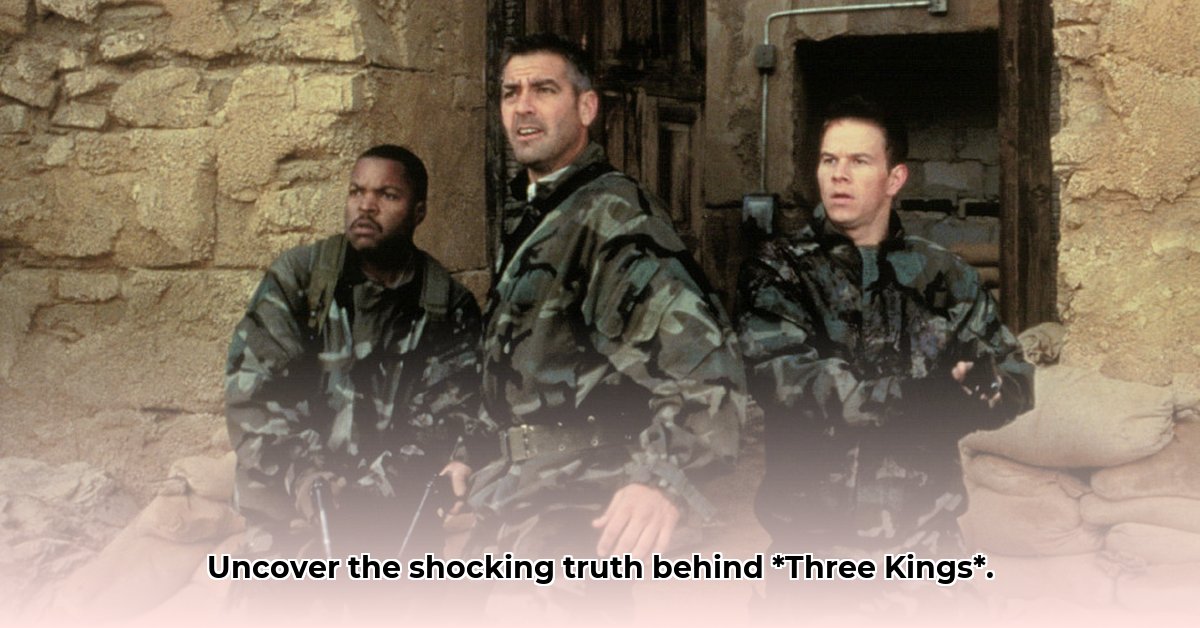
Right from the start, Three Kings isn't your average war movie, is it? Forget flag-waving and rah-rah narratives; this film throws you headfirst into the messy, morally grey aftermath of the Gulf War. It leaves you questioning everything, long after the credits roll. This ain't about neat heroes and villains; it's about the complicated stuff, the stuff that stays with you.
A Concise Plot Summary
Four American soldiers, fresh off the victory in the Gulf War, stumble upon a map leading to a massive stash of Kuwaiti gold, looted during the invasion. Initially driven by the promise of riches, their mission undergoes a dramatic shift as they encounter the harsh realities faced by Iraqi civilians and the lingering effects of the conflict. Their motivations evolve, forcing them into morally ambiguous situations, blurring the lines between self-interest and intervention.
Thematic Analysis: A Moral Minefield
Three Kings brilliantly explores the moral complexities of war, specifically its aftermath. The film doesn't offer easy answers; it forces us to confront the uncomfortable truths about the lasting impact of conflict. The soldiers’ transformation from opportunistic treasure hunters to reluctant saviors highlights the blurred lines between self-interest and humanitarian intervention. The film subtly but effectively critiques the unintended consequences of war, showcasing the devastating human cost that extends far beyond the battlefield.
A key question arises: How do we reconcile the pursuit of personal gain with the overwhelming moral responsibility for the well-being of those affected by war? The film doesn’t provide pat answers, instead creating a deeply compelling examination of human nature subjected to severe stress.
Character Analysis: Shades of Grey
Each soldier is richly developed, a complex tapestry of flaws, strengths, and evolving moral viewpoints. Their motivations shift throughout the film, mirroring the chaotic reality they inhabit and forcing them to confront the consequences of their actions. This nuanced portrayal makes them relatable despite their questionable choices, prompting the audience to ask: "What would I have done?" This crucial question is central to the film's impact.
Directorial Style: Dark Humour and Intense Drama
David O. Russell's direction masterfully balances dark humour and dramatic intensity. The unpredictable tone mirrors the chaotic nature of war, using laughter as a coping mechanism against harsh realities. This isn't frivolous humour; it's a powerful tool that highlights the absurdities of their situation, preventing the film from becoming overly grim. This contrast greatly enhances the impact of the film's moral complexities.
The Gold: A Symbol of Corruption
The looted gold transcends mere treasure; it becomes a potent symbol of war's corruption and long-term consequences. It represents the spoils of conflict, a physical manifestation of the enduring repercussions. The soldiers’ pursuit of it serves as a catalyst, highlighting the ethical dilemmas they face, and mirroring the ethical dilemmas faced by audiences considering the legacy and impact of conflict.
Conclusion: A Lasting Impression
Three Kings is not just a war movie. It's a profound exploration of the human condition under extreme pressure, a commentary on the moral ambiguities that permeate even the most seemingly straightforward situations. The film's deliberate ambiguity, leaving viewers with lingering questions, contributes to its enduring power. It prompts reflection, discussion, and a lasting impression that firmly cements its place amongst the best war films ever made. Its relevance extends beyond its specific historical context, resonating with contemporary debates on the ethics of military intervention and the enduring human cost of conflict. It makes you think. And that's what makes it so powerful.